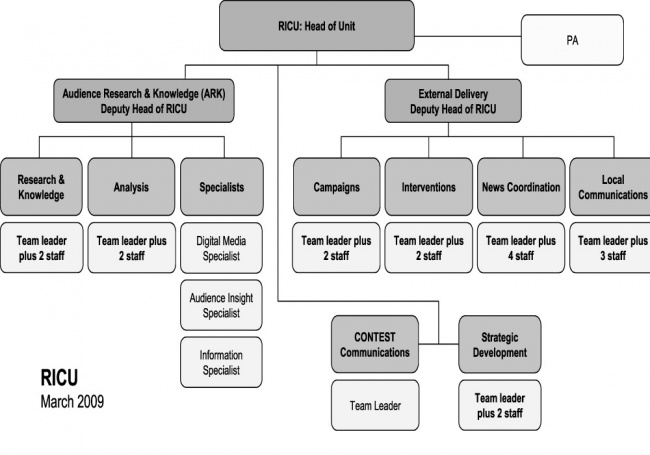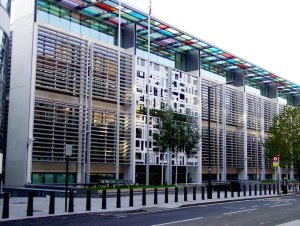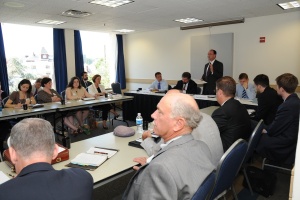Research, Information and Communications Unit

This article is part of the Counter-Terrorism Portal project of Spinwatch. |

|
This article is part of the Propaganda Portal project of Spinwatch. |
The Research, Information and Communications Unit (RICU) is a strategic communications unit within the UK's Office for Security and Counter-Terrorism. Based in the Home Office it is also funded by and answerable to the Foreign Office and the Department for Communities and Local Government.[1]
Creation and purpose
The Sunday Times reported in December 2007 that:
- The alleged airline plot in August 2006 caused another of the government’s periodic rethinks. For all the work on pursuing terrorists, the government realised that its strategy on preventing more taking their place was not working. After a bureaucratic tussle, the Home Office has become the centre for a new strategic hub for all counterterrorism policy: the Office of Security and Counter Terrorism.
- The rethink also led to the creation of the nebulously titled Research, Information and Communications Unit (RICU). Officials deny this is in any way a propaganda department, although one conceded: “It does sound horribly cold war.”
- Its task is to analyse the way in which key audiences at home and abroad (in other words, Muslims) react to messages from the government and to try to give more coherence to those messages to undermine the ideology of Al-Qaeda. In the counterterrorist jargon of the day, its job is to build and promote a counter-narrative to the single narrative that Al-Qaeda and its allies propagate. “You can do it without it looking like government propaganda, because if it looks too much like government propaganda then I don’t think people are going to listen, nor should they,” argues Mottram.[2]
Location of RICU
The RICU is part of the The Home Office.[3]
The Home Office is located at 2 Marsham Street, London, SW1P 4DF
Size and staffing
According to the Home Office, the total numbers of staff in RICU was as follows:
- June 2007- 3
- Sept 2007- 8
- Dec 2007- 10
- Mar 2008- 12
- Jun 2008- 17
- Sept 2008- 28
- Dec 2008- 33 (including secondees).[4]
Budget
Home Office figures on the cost of RICU are as follows.[5]
2008/2009 Budget
Programme Budget
- Total: £2,172,610
- Home Office contribution: £660,000
- Foreign and Commonwealth Office contribution: £810,073
- Department of Communities and Local Government contribution: £702,537
Administration Budget
- Pay: £806,138
- Non-Pay: £153,167
2009/2010 Proposed Budget
Programme Budget
- Total: £5,700,000
- Home Office contribution: £1,200,000
- Foreign Commonwealth Office contribution: £3,000,000
- Department of Communities and Local Government contribution: £1,500,000
Administration Budget
- Pay: £867,000
- Non-Pay: £154,000
Structure
As of March 2009, the RICU consists of the Head of Unit and his Personal Assistant. The Head of Unit oversees two branches. Both of the branches has a Deputy Head and separate teams.[6]

Audience Research & Knowledge (ARK) Branch
This branch includes five teams.
- Research and Knowledge: team leader and 2 staff
- Analysis: team leader and 2 staff
- CONTEST communications: team leader
- Strategic Development: team leader plus 2 staff
- Specialists: Digital Media Specialist, Audience Insight Specialist, Information Specialist
External Delivery Branch
This branch includes four teams.
- Campaigns: team leader and 2 staff
- Interventions: team leader and 2 staff
- News Coordination: team leader and 4 staff
- Local Communications: team leader and 3 staff
All of the above information was provided by the Home Office.[8]
Activities
Language of Counter-Terrorism
The RICU demands civil servants not to use phrases such as "Islamist extremism" and "jihadi-fundamentalist." This is due to the fact that the organization wishes to thwart any ideas of a fundamental connection between islamic beliefs and terrorism. Civil servants are required to refer to terrorism and terrorist groups as "violent extremism," "criminal murderers," and "thugs."
Conference presentations
On June 24, 2008, Jonathan Allen (head of RICU) was featured at a panel discussion called "Words Matter: The Role of Lexicon in Counter-Terrorism Communications Strategy." The discussion was hosted by the Homeland Security Policy Institute. The other featured speakers were Daniel Sutherland (Officer for Civil Rights and Civil Liberties at the US Department of Homeland Security), and Jeffrey Imm, (research director for the Counterterrorism Blog and former analyst with the FBI).
On Tuesday, 7 October 2008 at 15:00, Jonathan Allen, Head of the RICU, spoke at a conference called "Public Diplomacy: Meeting New Challenges" held at Wilton Park in West Sussex. He spoke during a section of the conference called, "How to Change Public Behavior: A Foreign Policy Context." His fellow speakers during this section of the conference included Klavs Holm (Under Secretary, Ambassador, Ministry of Foreign Affairs, Copenhagen), and David Kenning (Chief Strategist, Bell Pottinger Sans Frontieres, London).
RICU discussed with Pakistan government
November 2008, Home Secretary Jacqui Smith met with Pakistan's Information and Broadcasting minister Sherry Rehman at the House of Commons to discuss bilateral issues and combating terrorism. Smith said that military force alone will not stamp out terrorism. Smith discussed the British counter-terrorism strategy, which is the RICU, with Rehman. Smith said that the RICU "...plans advances and amplifies the objectives in today's crowded mobile world." She then said that Rehman has Britain's support in creating and implementing a similar organization in Pakistan. Rehman discussed Pakistan's problem with terrorism using the assassination of Mohtarma Benazir Bhutto as an example.
Help For Syria campaign
The Guardian reported in May 2016 that RICU had used communications company, Breakthrough Media Network to undertake the 'Help for Syria' campaign, seeking to advise on how to support Syrian refugees without revealing government involvement.[9]
Projects Undertaken
According to the Home Office, the following are the projects that have been undertaken by the RICU since its formation:[10]
- Youth Segmentation: A project that looked at how young British Muslims felt about their identity and sense of belonging. Completed. Period of Research - Early 2008, Research company contracted Define Research.
- Online Behaviours: A project that studied how young British Muslims use the internet. Project has been completed. Period of Research - March-April 2008, Research company contracted Connect Research.
- Media Consumption: A project that looked at media consumption among British Muslims. Project has been completed. Period of Research - Early 2008, Research company contracted TNS
- Counter-Terrorism Message Testing: A study researching how Government messages are perceived by Muslim communities. Project has been completed. Period of Research - Mid 2007 - Early 2008, Research company contracted Turnstone
- Estimating Network Size and Tracking Information Dissemination Amongst Islamic Blogs: A study that researched the size of blog readership. Project has been completed. Period of Research - Early 2008, Research company contracted 'Academic at University of Nottingham'.(See main article: Estimating network size and tracking information dissemination amongst Islamic blogs)
- The Language of Terrorism: A project that studied public discourse of counter-terrorism themes. Project has been completed. Period of Research - January 2007 - March 2008, Research company contracted TNS
- Credible Voices: A project that studies why some voices are more credible than others to Muslim communities. Project is currently underway.
- Audience Insight Qualitative Phase I: A project that looked at understandings of 'Britishness' and terrorism and where these feelings come from within the British population. Project has been completed.
- Audience Insight Quanititative Phase II Segmentation: A survey of attitudes, behaviours and general demographics of the British population. Project is currently underway.
- Audience Insight Quantitative/Qualitative Phase III Evaluation (Pilot): A qualitative and quantitative study of shifting attitudes across the population. Project is currently underway.
People
The RICU was created as a result of the advice of Dr. J. P. Macintosh, who is currently the head of the Advanced Research and Assessment Group (ARAG) for the Defence Academy of the United Kingdom. "He catalysed the use of a "war room" facility to begin building the capacity needed to transform the Home Office. His advice was "instrumental in the creation of the Office of Security and Counter Terrorism (OSCT) and the Research Information & Communication Unit (RICU)."[11]
- Jonathan Allen 'In 2007 he moved to the Office for Security and Counter-terrorism (OSCT), where he established and led the Research Information and Communications Unit (RICU), a cross-departmental strategic communications body.'[12]
Staff
- Matt Collins Director of Prevent and RICU
- Richard Chalk: Head of Research, Information and Communications Unit[13]
- Jonathan Allen: Former Head of Research, Information and Communications Unit, 2007 - April 2009.
- Peter Wilson, UK Home Office, Deputy Director, Head of the Research Information Communications Unit (RICU) (Circa 2017)[14]
- Christopher Wainwright Deputy Director, Strategic Communications UK Home Office, 2010 - 2012[15]
- Andrew Garner | Paul Mott 'Counter Terrorism communications' - attended the 2008 Newsxchange conference on behalf of RICU[16] | Michael Nevin (seconded from FCO, 2007-2008)[17][18] | Stephen Rimmer (director of Prevent and RICU circa February 2008 - February 2009[19] | Paul Smith (seconded from ACPO) | Paul Drew circa July 2015 [20] | Sarah Moore, UK, Home Office, RICU Media Team (Circa 2017)[14] | Debbi Gupta
Journalists in touch with RICU
- Frank Gardner BBC Security Correspondent
Others in contact
- David Stevens - University of Nottingham - undertook a placement at RICU from November 2007-Mar 2008
Resources, Publications, Contact
Resources
- http://www.homeoffice.gov.uk/about-us/freedom-of-information/released-information/foi-archive-crime/1352-government-anti-terrorist?view=Html
- http://www.esrcsocietytoday.ac.uk/ESRCInfoCentre/ViewAwardPage.aspx?ts=2&data=z8HSvl3fWwVY2sDo4JNP8iOLJQdQnq85MsSF4JQ2cVHRt6Z80eapox%2Fh0w35tsA8Z2n1ly0T8vM7xXdhNkbQrgQxDMr5xj13O34dr3%2BZd1Q%3D
- http://www.fromthefrontline.co.uk/blogs/index.php?blog=18&title=title_70&more=1&c=1&tb=1&pb=1
- http://www.esrcsocietytoday.ac.uk/ESRCInfoCentre/opportunities/current_funding_opportunities/pfs_ricu07.aspx?ComponentId=24171&SourcePageId=13306
- http://www.homeoffice.gov.uk/about-us/freedom-of-information/released-information/foi-archive-crime/1352-government-anti-terrorist?view=Html
- http://www.dailymail.co.uk/news/article-1084977/Confusing-PC-language-hampering-anti-terror-fight-government-watchdog-says.html?ITO=1490
- http://www.guardian.co.uk/world/2008/aug/26/alqaida.terrorism
- http://www.guardian.co.uk/media/2008/aug/28/bbc.pressandpublishing
- http://www.fco.gov.uk/resources/en/word/5029385/5029509/5029751/ricu-info-for-candidates
- http://www.theyworkforyou.com/wrans/?id=2007-12-11e.172384.h
- http://security.homeoffice.gov.uk/about-us/RICU/
- http://ukinsouthafrica.fco.gov.uk/en/newsroom/?view=News&id=8985566
- http://www.communities.gov.uk/news/corporate/1055379
- http://www.communities.gov.uk/documents/communities/pdf/1098129.pdf
- http://www.thesargeants.net/dblog/articolo.asp?articolo=168
- http://www.gwumc.edu/hspi/lexiconsummary.htm
- http://www.wiltonpark.org.uk/documents/conferences/WP902/pdfs/WP902prog.pdf
- http://discussions.bbcamerica.com/jiveforums/thread.jspa?messageID=62853
- http://www.unitedstatesaction.com/blog/imm-articles/101.html#T01
- http://www.unitedstatesaction.com/blog/imm-articles/101.html#T02
- http://www.buckscc.gov.uk/moderngov/Published/C00000127/M00002795/AI00004223/$CCEFPreventBriefing.docA.ps.pdf
- http://www.fco.gov.uk/resources/en/word/5029385/5029509/5029751/ricu-info-for-candidates
- http://security.homeoffice.gov.uk/news-publications/publication-search/comms-with-public-and-partners/RICU-research/index.html
- https://isc.independent.gov.uk/wp-content/uploads/2022/07/E02710035-HCP-Extreme-Right-Wing-Terrorism_Accessible.pdf
Publications and reports
Responses to FoI requests
- Home Office Budget - RICU Structure etc Freedom of Information Request – our ref 11382, 20th April 2009
- Home Office List of RICU Documents Produced and No. of Non-doscloable Titles and Their Ref Numbers, Freedom of Information Request – our reference 11685, 7th July 2009.
Publications and reports disclosed or published
- Paul Smith, APCO/NCSB Police Advisor, RICU Local Communications Team, date unknown.
- CounterTerrorism Communications Guidance: Communicating Effectively with Community Audiences (RICU/12/07), September 2007[21]
- Stephen Rimmer, Director, Prevent & RICU, Office for Security and Counter-Terrorism, [http://www.scribd.com/doc/49164753/Ricu-Ppt-on-Prevent-amp-Ricus-Role UK Security and Counter-Terrorism: �Preventing Extremism: The Challenge for London] Presentation to London Community Safety Partnership, 12 February 2008 (Powerpoint file)
- RICU RICU AUDIENCE ANALYST INFORMATION FOR CANDIDATES, 2008.
- RICU - Young British Muslims Online
- RICU - Understanding Perception of the Terms Britishness and Terrorism
- TNS Media Intelligence The Language of Terrorism - Analysing the Public Discourse and Evaluating RICUs Impact, January 2007 - March 2008 RESTRICTED
- RICU, Estimating Network Size and Tracking Information Dissemination Amongst Islamic Blogs
- RICU, Credible Voices - Exploring Perceptions of Trust and Credibility in Muslim Communities
- RICU, [ Counter-terror message testing: Qualitative research report], March 2010 (Research completed April 2008)
- David Stevens, Estimating network size and tracking information dissemination amongst Islamic blogs, March 2010 (Research completed April 2008), Research, Information and Communications Unit, Home Office. ISBN 978-1-84987-162-4
- RICU, Research, Information and Communications Unit British Muslim Media Consumption Report March 2010 (Research completed June 2008) ISSN 2042-8251 ISBN 978-1-84987-160-0
List of RICU publications in series including non disclosed titles
- Number Title Note on function or role of paper and intended audience
- RICU-01-07 Overview Introduction and overview of RICU’s embryonic role and remit for Whitehall partners
- RICU-02-07 The Communications Challenge For Whitehall partners: setting out RICU’s role in countering the terrorist narrative
- RICU-03-07 Core Counter Terrorism Language and Messages For all CT communicators: guidance on effective communication with British Muslim audiences.
- RICU-04-07 Co-Ordinated Communications Short paper discussing RICU’s remit to co-ordinate government communications work.
- RICU-05-07 Islam the Basics Paper looking at Origins, Beliefs, Everyday Practices, History, and Sects of Islam and Islam and Culture.
- RICU-06-07 Communications Grid wd 25 June 07 Forward look at events that might impact CT Comms
- RICU-07-07 Title witheld by Home Office on grounds of 'national security'.[22]
- RICU-08-07 Title witheld by Home Office on grounds of 'national security'.[22]
- RICU-09-07 Title witheld by Home Office on grounds of 'national security'.[22]
- RICU-10-07 UK Muslim Communities Media Consumption Note Short paper looking at media consumption by Muslim communities (audience No 10)
- RICU-11-07 Framing the Debate (Hearts and Minds) Short paper discussing the importance of careful use of language to engage people better in discussion
- RICU-12-07 Counter Terrorism Communications Guidance (Unclassified version of RICU 03/07) For broader range of communicators: guidance on effective communication with British Muslim audiences.
- RICU-13-07 Title witheld by Home Office on grounds of 'national security'.[22]
- RICU-14-07 Title witheld by Home Office on grounds of 'national security'.[22]
- RICU-15-07 Communicating Shared Values For CT communicators at national, local and international level: Preliminary *RICU guidance on understanding and communicating possible shared values.
- RICU-16-07 Muslim Grievances For CT officials and wider delivery audience beyond immediate CT community: guidance on identifying and addressing a range of political and socio-economic issues exploited as “Muslim issues” in the promulgation of a terrorist narrative.
- RICU-17-07 Title witheld by Home Office on grounds of 'national security'.[22]
- RICU-18-07 Title witheld by Home Office on grounds of 'national security'.[22]
- RICU-19-07 CT Bill 2000 Guidance for those with responsibility for communicating or discussing the Counter Terrorism Bill. It consolidates RICU communications analysis and advice around the Bill, including recommendations on how best to communicate proposals, focussing in particular on pre-charge detention.
- RICU-20-07 Title witheld by Home Office on grounds of 'national security'.[22]
- RICU-21-08 Terrorism what do we call it For Whitehall, local and international partners: think piece on defining and talking about the nature of the terrorist threat facing the UK and its underlying ideology, without apportioning undue blame onto particular communities or a religion.
- RICU-22-08 RICU Evaluation Framework Paper discussing how RICU can evaluate if it is focusing on the right activities and if it is having a positive impact on relevant outcomes
Contact
http://security.homeoffice.gov.uk/about-us/RICU/
Notes
- ↑ Security and Counter Terrorism Science Business Plan, Home Office, date unknown, see. pp. 8-9, accessed 24.03.10
- ↑ Gordon Corera Don’t look now, Britain’s real spooks are right behind you The Sunday Times December 2, 2007
- ↑ The Home Office (2009) Freedom of Information Response. (email correspondence from J. Fanshaw to D. Miller) 20, April 2009. Received 20, April 2009. 09:30
- ↑ The Home Office (2009) Freedom of Information Response. (email correspondence from J. Fanshaw to D. Miller) 20, April 2009. Received 20, April 2009. 09:30
- ↑ The Home Office (2009) Freedom of Information Response. (email correspondence from J. Fanshaw to D. Miller) 20, April 2009. Received 20, April 2009. 09:30
- ↑ The Home Office (2009) Freedom of Information Response. (email correspondence from J. Fanshaw to D. Miller) 20, April 2009. Received 20, April 2009. 09:30
- ↑ The Home Office (2009) Freedom of Information Response. (email correspondence from J. Fanshaw to D. Miller) 20, April 2009. Received 20, April 2009. 09:30
- ↑ The Home Office (2009) Freedom of Information Response. (email correspondence from J. Fanshaw to D. Miller) 20, April 2009. Received 20, April 2009. 09:30
- ↑ Ian Cobain, Alice Ross, Rob Evans and Mona Mahmood, Revealed: UK's covert propaganda bid to stop Muslims joining Isis, Guardian, 2 May 2016.
- ↑ Data on topics and whether project completed from The Home Office (2009) Freedom of Information Response. (email correspondence from R. Stokes to D. Miller) 8, April 2009. Received 20, April 2009 16:51; data on period of research and name of company undertaking research from J Fanshaw, Direct Communications Unit, Home Office 'Freedom of Information response - Ref 11707, Annex A Details of RICU Research', 27 May 2009, 10.08
- ↑ Defence Academy Dr. J. P Macintosh, accessed 6 May 2009
- ↑ https://www.gov.uk/government/people/jonathan-allen
- ↑ Ian Cobain, Alice Ross, Rob Evans and Mona Mahmood, Inside Ricu, the shadowy propaganda unit inspired by the cold war, Guardian, 2 May 2016
- ↑ 14.0 14.1 Club of Venice Seminar on strategic communications challenges for Europe, 16 and 17 March 2017
- ↑ LinkedIn Chris Wainwright
- ↑ Newsxchange 08 Delegate List 2008, accessed 20 April 2009
- ↑ Change of Her Majesty's Ambassador to Iceland Foreign and Commonwealth Office, 5 April 2016, accessed 21 May 2016
- ↑ Jim Armstrong, Candace J. Chin, Uri Leventer The Language of Counter-Terrorism: When Message Received is Not Message Intended Harvard Kennedy School Policy Analysis Exercise, Prepared for the United Kingdom Foreign and Commonwealth Office, British Consulate-General, New England, April 2008: Acknowledgements
- ↑ Stephen Rimmer Allegations made in the Panorama programme 'Muslim First - British Second' on Monday 16 February, 17 February 2009, accessed 1 April 2009
- ↑ https://www.ncjrs.gov/pdffiles1/nij/249947.pdf
- ↑ cited in Home Office Part 2 of the government's Prevent Strategy, Objective 5: Addressing Grievances, published 3 June 2008, p.44. accessed 7 February 2009
- ↑ 22.0 22.1 22.2 22.3 22.4 22.5 22.6 22.7 The Home Office maintained the following as its reason for non-disclosure: 'he details of these documents are withheld in reliance on section 24(1) of the Freedom of Information Act. Section 24(1) of the FOIA provides that information can be withheld where exemption from disclosure is required for the purpose of safeguarding national security and where the public interest falls in favour of non-disclosure. Considerations which favour the disclosure of the requested information in this case include the promotion of openness and transparency in government, the benefits of greater public knowledge regarding matters of national security and the particular public interest in further information being put in to the public domain regarding the provisions of the Prevention of Terrorism Act 2005. Home Office List of RICU Documents Produced and No. of Non-doscloable Titles and Their Ref Numbers, Freedom of Information Request – our reference 11685, 7th July 2009.

